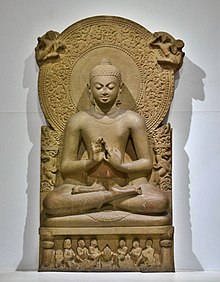You are currently logged-out. You can log-in or create an account to see more talks, save favorites, and more. more info
Buddha Talks

Siddhartha Gautama, most commonly referred to as the Buddha (lit. 'the awakened one'), was a wandering ascetic and religious teacher who lived in the eastern Indo-Gangetic Plains during the 6th or 5th century BCE and founded Buddhism. According to Buddhist legends, he was born in Lumbini, in what is now Nepal, to royal parents of the Shakya clan, but renounced his home life to live as a wandering ascetic. After leading a life of mendicancy, asceticism, and meditation, he attained nirvana at Bodh Gaya in what is now Bihar, India. The Buddha then wandered through the lower Indo-Gangetic Plain, teaching and building a monastic order (sangha). Buddhist tradition holds he died in Kushinagar (in modern day Uttar Pradesh, India) and reached parinirvana ("final release from conditioned existence").
According to Buddhist tradition, the Buddha taught a Middle Way between sensual indulgence and severe asceticism, leading to freedom from ignorance, craving, rebirth, and suffering. His core teachings are summarised in the Four Noble Truths and the Noble Eightfold Path, a training of the mind that includes ethical training and kindness toward others, and meditative practices such as sense restraint, mindfulness, dhyana (meditation proper). Another key element of his teachings are the concepts of the five skandhas and dependent origination, describing how all dharmas (both mental states and concrete 'things') come into being, and cease to be, depending on other dharmas, lacking an existence on their own (svabhava).
While in the Nikayas, he frequently refers to himself as the Tathāgata; the earliest attestation of the title Buddha is from the 3rd century BCE, meaning 'Awakened One' or 'Enlightened One'. His teachings were compiled by the Buddhist community into the Vinaya Piṭaka, containing codes for monastic discipline, and the Sūtra Piṭaka, a collection of discourses attributed to him. These were passed down in Middle Indo-Aryan dialects through an oral tradition. Later generations composed additional texts, such as systematic treatises known as Abhidharma, biographies of the Buddha, collections of stories about his past lives known as Jataka tales, and additional discourses, i.e., the Mahāyāna sūtras.
Buddhism evolved into a variety of traditions and practices, represented by Theravāda, Mahāyāna and Vajrayāna, and spread beyond the Indian subcontinent. While Buddhism declined in India, and mostly disappeared after the 8th century CE due to a lack of popular and economic support, Buddhism has grown more prominent in Southeast and East Asia.
| Title | Speaker | |
|---|---|---|
Lecture To Prof. Lewis R. Lancaster's Visiting ClassSerial: SR-00259 Practice and enlightnment as forgetting and letting go of everything. Even if we don't know what real practice is, continuing and allowing it to reveal itself. Answering... Buddha, Emptiness, Zazen, Don't Know Mind, Emptiness, Building, Suzuki Roshi,... |
Mar 01 1970 Tassajara |
|
Lotus Sutra, Lecture No. II-1Serial: SF-05681 [Second Lotus Sutra series in 1968] Lotus Sutra, Buddha, Nirmanakaya, Buddhism |
Oct 20 1968 Tassajara |
|
Everything Itself Is BuddhaSesshin, Buddha Nature, Observe, Buddha, Practice |
Dec 06 1967 B Tassajara |
|
CausalitySerial: SF-05093J Suzuki lecture 6pm Weds Track 2, continued on Track 3 Sesshin, Time, Time, Buddha, Freedom |
Aug 17 1966 6:00pm Sokoji |
|
We Are Not PerfectSerial: SF-05080A Sesshin talk. At the beginning, Suzuki Roshi is drawing from Dogen's "Bodhisattva's Four Methods of Guidance." The methods are also in Shushogi. Sesshin, Bodhisattva, Shushogi, Buddha Mind, Buddhism, Buddha |
Jul 23 1966 Sokoji |
|
Afternoon Service and Meal ChantSerial: SF-05112C Tape 1 Summer sesshin 1965, Monday 1st day of sesshin (?) July 26th 1965 Tape 1 Side 1: afternoon service; meal chant Chanting, Buddha |
Jul 26 1965 Sokoji |